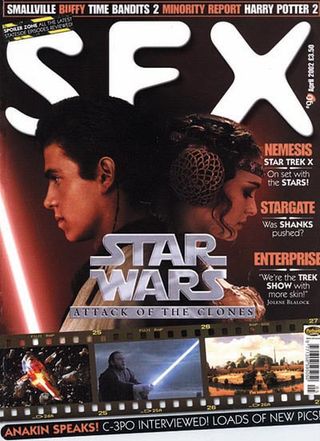SFX Issue 90
None

April 2002
News:
Pullman Triumph
Fantasy comes to the fore at the prestigious Whitbread Awards
“Strictly speaking the Whitbread prize was for the third book,” he tells SFX . “But all the commentators seem to treat the trilogy as one long story, which of course it is.” (The first two books in the series, Northern Lights and The Subtle Knife , have been collected with The Amber Spyglass in a single hefty volume).
Pullman’s epic was a massive critical and commercial success, drawing Hollywood’s attention. New Line, already riding high on the success of The Lord Of The Rings , has snapped up the trilogy.
“It’s one of those books that just captures your imagination and runs with it,” says New Line Production President Toby Emmerich, “When LOTR is over, hopefully we won’t miss a beat.”
Pullman is cautious, though, and doubts he will have much to do with the script. “If it was a literal adaptation,” says the author, “it would be very long and not very successful. For the story to work on screen, it would have to be completely rethought in cinematic terms. I couldn’t do that, because I write books.”
At present, Pullman is writing a much shorter book with a fairy-tale theme, provisionally titled The Scarecrow And His Servant . However, he doesn’t rule out a return to his more epic creation. “It would be another story, or series of stories, set mostly in Lyra’s universe as seen in Northern Lights .”
Sign up to the SFX Newsletter
Get sneak previews, exclusive competitions and details of special events each month!
Notoriously, Pullman has often insisted that His Dark Materials is not fantasy but stark realism. It seems a strange description of a saga where characters travel to the world of the dead and polar bears use flamethrowers against zeppelins. Pullman concedes his comments were teasing, but raised an important point.
“I have great respect for the possibilities of fantasy,” he says. “It’s possible to use the apparatus to say interesting things about humanity, but I’m not sure that’s been the main concern of fantasy writers. They’re often more interested in telling nail-biting adventure stories or detailing the wars between dozens of imaginary races.
“That’s fine in itself, but I’m much more interested in how people behave, their psychology, how they learn and grow up, and how they can become moral beings in a grey and uncertain world. One book that works very well on that level is A Voyage To Arcturus (an allegorical fantasy written in 1920 by David Lindsay). I want all the fantasy elements in my stories to illuminate the realities of human beings.”

Dave is a TV and film journalist who specializes in the science fiction and fantasy genres. He's written books about film posters and post-apocalypses, alongside writing for SFX Magazine for many years.
Most Popular



